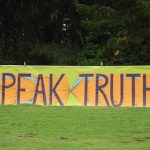Storytelling has become a buzzword, a “strategy,” a trope of journalists and influence peddlers and sales pitchers and TED speakers. Copywriters are now “strategic storytellers” (yours truly included), spit-balling in conference rooms about which narrative device might trigger enough “pain” or “aspiration” to propel someone to purchase whatever product they happen to be pushing. Journalists click-bait their stories by choosing the most shocking and salacious of “characters” and “hooks.” And we speakers love to wax poetic about important-sounding “techniques” like ensuring that your talk has an “emotional core” and a “universal truth.”
What a load of pretentious poppycock.
Sure, it all makes sense. Stories and their components are key to communication, and as a lifelong communication practitioner, a journalist and writer and author, I obviously care deeply about all of them. And yet. The problem with this complexity is that something has been lost. Something essential and basic and human. Something less formal and more real.
The definition of story is “an account of incidents or events.” That means telling someone about something that happened and having that person listen. We humans have done this for thousands upon thousands of years, using cave paintings and oral histories to say we were here and maybe take a stab at why and for what. Sharing our experiences and hearing others do the same is the way we make sense of ourselves and of our role in the world. Not only that, it’s the way we attempt to make sense of the world. And to survive it and hopefully thrive despite or even because of its hardest edges.
A reader recently sent me this beautiful New York Times Modern Love essay entitled, “The Accident No One Talked About.” It’s about the suffering caused when one young man’s family opted to avoid discussing an accident that took his friend’s life. Ultimately, it’s about the healing power the young man found in finally sharing that experience and being heard.
I first learned about stories’ power to heal when I was 10 and my best friend’s father died. I wrote about his death for the “what did you do this summer” English assignment, and after my teacher read it aloud to all of his sixth-grade students and many of my peers confided to me that they, too, had experienced deaths and that my essay made them feel relieved, I discovered that telling my story somehow made all of us feel better. It made us feel closer and less alone.
When I was reporting my book, Triumph of the Heart: Forgiveness in an Unforgiving World (the only book on forgiveness that explores the topic through reportage, science and memoir), I saw how stories heal not just individually, but also collectively. In Rwanda, exploring the possibility of forgiveness after genocide, I spent time with a group of genocide survivors and perpetrators who went through a six-month process of testimonial sharing and empathic listening. The survivors had lost husbands and wives and children when in 1994 their neighbors turned on them with machetes. They told me how important it was for them to tell the killers, in person, exactly what they went through and how they felt about it. To see the looks on the killers’ faces as they listened, the pain and remorse they felt at what they had done.
The perpetrators had not only apologized but also made attempts at restitution through working their victims’ fields or offering them a valuable cow or goat. One man who killed his neighbor was now a friend to the neighbor’s widow and the godfather of her son. It is impossible to underestimate the role that storytelling has played in the ability of these villagers to repair their relationships and live peacefully side by side. The act of sharing your pain and seeing another hear it, take it in, and feel it himself – that is redemptive. And so is experiencing the pain of someone you’ve hurt, and seeing how in hurting them you hurt yourself. Stories and empathic listening can play a vital role in fostering connection, understanding and forgiveness of all kinds – self-forgiveness, forgiveness of others, and the search for forgiveness as redemption.
These stories don’t have to be dramatic matters of life and death. Yesterday at the gym, I called up a girlfriend to debrief a frustrating call I’d had at work, which in ten minutes we handily placed into a somewhat palatable context, and then she in turn told me about a challenge within her organization. We debriefed, laughed at our egoic reactions, and then returned to work, reinvigorated. You can tell a story to a stranger on a bus or over a simple cup of tea, just remember to tell them. And gossip is not a substitute. Sure, it’s often easier and less vulnerable to yak at length about the travails and shortcomings of others, and sure, technically that claptrap qualifies as story. But for what? The connection fostered by second-hand gossip is thin and cheap, not worth your time or mine.
Our stories can be a means of simple, authentic connection, grief healing and trauma recovery. They can also be a means of collective peacebuilding. But only if we use them – not just as strategies or devices or precious tales but as the parts of ourselves that long to be heard and held. Only if we sit down with the people we care about and tell them about our day, or our year. And ask them about theirs. Even when it’s unpleasant or excruciating. Especially then.






